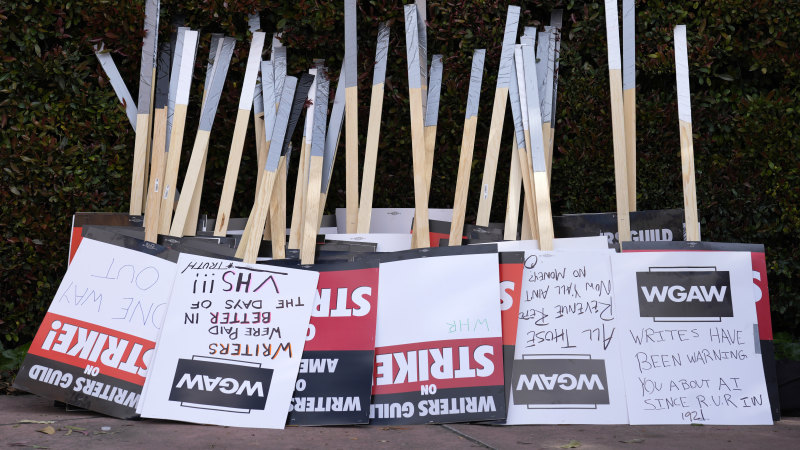Save articles for later
Add articles to your saved list and come back to them any time.
Los Angeles – Hollywood writers can return to work on Wednesday (US time) after union leaders voted unanimously to lift strike orders, approving a deal that gives writers pay rises and some protection around the use of artificial intelligence (AI).
The 11,500 members of the Writers Guild of America will have until October 9 to cast their votes on the contract and can resume work in the meantime.
Placards are gathered at the close of a picket outside Walt Disney Studios in May.Credit: AP Photo/Chris Pizzello, File
Under the tentative agreement, AI cannot be used to undermine a writer’s credit. Writers can choose to use AI when drafting scripts, but a company cannot require the use of the software. The studios must disclose to a writer if any materials were generated by AI.
The studios are not expressly prohibited from using AI to generate content. Writers, however, have the right to sue if their work is used to train AI.
The studios agreed to meet at least twice a year with the guild to discuss plans to use AI in film development and production.
In other areas, the guild said it won guarantees of minimum staffing in writers’ rooms, a key issue for many of its members. Staffing will be determined by the number of episodes per season. Minimum pay rates will climb by more than 12 per cent over three years.
Residuals – compensation for the re-use of a writer’s work – will rise for the use of TV shows and movies outside of the United States and a bonus will be awarded for the most popular shows on streaming.
“These are essential protections that the companies told us, to our faces, that they would NEVER give us,” writer Adam Conover, a member of the guild’s negotiating committee, posted on social media platform X (formerly Twitter).
“But because of our solidarity, because they literally cannot make a dollar without us, they bent, then broke, and gave us what we deserve. WE WON,” Conover said.
Television writer David Slack said: “Our strike was necessary. Our strike was effective. Our strike is a victory.”
Film and television writers walked off the job in May. The strike is the second-longest-running Holywood writers’ strike in history, at 148 days. A strike in 1988 ran for 153 days.
The guild said the estimated value of the deal was $233 million per year.
Union leaders “voted unanimously to lift the restraining order and end the strike as of 12.01 am PT/3.01 am ET on Wednesday, September 27th,” the guild said in a statement.
The strike’s end also means daytime and late-night talk shows can return to the air. Drew Barrymore was among talk show hosts who had angered writers by saying this month that her talk show would return before the industrial action ended.
Actors Bob Odenkirk, left, and Jack Black join demonstrators outside the Paramount Pictures Studio in Los Angeles, on Tuesday. Actors are still on strike with no talks planned.Credit: AP Photo/Damian Dovarganes
The end of the writers’ strike does not return Hollywood to normal. The SAG-AFTRA actors’ union walked off the job in July and remains on strike. Filming cannot re-start until the actors reach a labor deal. The writers’ deal could serve as a template for actors, who share common concerns, including the desire for higher pay and for curbs on the use of artificial intelligence in entertainment.
It generated optimism among striking actors. “I hear it’s an exceptional deal and historically, whatever deal they give to one union, the next union uses as a template for their own deal,” writer and actor Mel Shimkovitz said on Tuesday (PT) while picketing outside Netflix.
Negotiators for the SAG-AFTRA actors’ union have not held talks with the alliance representing film and television studios including Walt Disney, Netflix and others, since this summer. Entertainment industry executives expressed the hope that negotiations would resume as soon as next week.
Performers want to protect their images and work from being replaced by “digital replicas” generated with AI. As with writers, actors are looking for compensation that reflects the value they bring to streaming, specifically, in the form of revenue sharing.
But SAG-AFTRA also is seeking gains in other areas. Actors want limits on self-taped auditions used in casting, which they argue are more costly than in-person readings.
They are looking for hair and makeup artists who can work with various hair textures and skin tones, to ensure equity for all performers. Actors are also seeking more leeway to work during increasingly long breaks between TV show seasons, among other things. Dancers, singers, background actors and stunt performers also have specific demands.
“Our fight isn’t over – it’s just heating up!” SAG-AFTRA posted on X on Tuesday night with pictures of Pedro Pascal, Bob Odenkirk and others on the picket lines.
“We’re committed to securing a fair contract because we deserve nothing less. Let’s keep pushing, keep fighting, and show the world our determination!”
Reuters, with Rollo Ross
Find out the next TV, streaming series and movies to add to your must-sees. Get The Watchlist delivered every Thursday.
Most Viewed in Culture
From our partners
Source: Read Full Article



